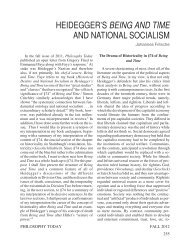SPINOZA'S VIRTUOUS PASSIONS
SPINOZA'S VIRTUOUS PASSIONS
SPINOZA'S VIRTUOUS PASSIONS
You also want an ePaper? Increase the reach of your titles
YUMPU automatically turns print PDFs into web optimized ePapers that Google loves.
774 MATTHEW J. KISNER<br />
respects, so is the mind rendered more capable of apprehension”<br />
(4p38d). 37 Since understanding increases one’s power (4p26–7),<br />
Spinoza also claims that increasing our understanding by being passively<br />
affected also increases our power. “That which so disposes the<br />
human body that it can be affected in more ways, or which renders it<br />
capable of affecting external bodies in more ways, is advantageous to<br />
man” (4p38). 38 As Spinoza summarizes the point in 4app27 “the advantage<br />
we get from things external to us” is the “experience and<br />
knowledge we gain from observing them and changing them from one<br />
form to another.” Our understanding of the particular properties revealed<br />
through passive encounters with external things is particularly<br />
important for us to act in ways which are to our advantage. For instance,<br />
my particular knowledge of the antivenom will incline me to<br />
carry antivenom on future hikes or to avoid hiking in areas with<br />
snakes and so forth. 39 This sort of knowledge allows us to navigate<br />
the world, telling us which foods make us sick, which bus goes uptown,<br />
which politician can be trusted and so forth.<br />
III<br />
Three Kinds of Virtue. While the foregoing explains how passions<br />
can be virtuous in the sense that they contribute to our power,<br />
do they qualify as virtuous in a moral sense of the term? While<br />
37<br />
This conclusion is spelled out in 4p18sch: “If we consider the mind,<br />
surely our intellect would be less perfect if the mind were in solitude and understood<br />
nothing beyond itself. Therefore there are many things outside ourselves<br />
which are advantageous to us and ought therefore to be sought.”<br />
38<br />
Spinoza offers a helpful example illustrating this reasoning when discussing<br />
titillatio (imbalanced bodily pleasure). Spinoza claims that titillatio<br />
can be excessive and bad because it can “hinder the body’s ability to be affected<br />
in numerous other ways” (4p43d). Presumably this is because excessive<br />
bodily pleasure disposes one to continue interacting with the world in<br />
the same way (say, through sex or drinking), without engaging in new activities<br />
which would increase one’s understanding (see also 4p60). In this way,<br />
our understanding may actually be hindered by not being sufficiently passive<br />
to external objects.<br />
39<br />
Of course, not all passivity will be to one’s advantage, as in the case of<br />
being bitten by a snake or run over by a bus. Nevertheless, I could only understand<br />
the antivenom by being passive, since any analysis of the antivenom<br />
from my own nature would only reveal general properties of extended things<br />
or metaphysical truths about modes.
















